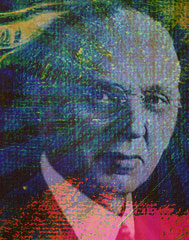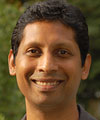Why Edgar Cayce?
By Jerry Lazarus
“Each of us has the same spirit that gives us the ability to interpret our dreams.”
 Over the years people have asked me why I’m interested in Cayce’s approach to dream interpretation. While I’ve studied Freud, Jung, and many contemporary dream theorists, none offer the depth, breadth, and scope of Cayce’s understanding of dreams.
Over the years people have asked me why I’m interested in Cayce’s approach to dream interpretation. While I’ve studied Freud, Jung, and many contemporary dream theorists, none offer the depth, breadth, and scope of Cayce’s understanding of dreams.
Cayce started interpreting dreams in 1923, some two decades after Freud published his work Interpretation of Dreams. Cayce placed an extraordinary emphasis on dreams, along with prayer and meditation. In reading 3744-2, Cayce said: “In this age, at present, 1923 … there is not sufficient credence given dreams; for the best development of the human family is to give the greater increase in knowledge of the subconscious, soul or spirit world. This is a dream.”
Cayce interpreted 1,500 dreams for 69 people over a 20-year period. These dreams were by no means unique; they were the everyday dreams of Everyman and Everywoman. It was his interpretations that set him apart from most dream theorists. Here we find a parallel to Cayce’s medical readings. Repeatedly, many doctors completely agreed with Cayce’s diagnoses, but they disagreed with his treatment methods.
Such immediate and accurate analysis, whether of dreams or of illnesses, poses an enormous challenge to conventional minds. How can we begin to fathom Cayce’s extraordinary abilities to work with dreams? His skills included but were not limited to:
- interpreting anyone’s dream with swiftness, surety, and accuracy
- recalling parts of or entire dreams forgotten by the dreamer
- correcting parts of dreams inaccurately recalled by the dreamer
- predicting when a person will dream about a certain topic, sometimes pinpointing the exact night
- interpreting the dream’s symbols and message before hearing the dream;
- connecting the theme in a current dream with a past one, describing what the dreamer had done or not done about it
- commenting on the dreamer’s undisclosed intimate details, including those of dreamers he wasn’t acquainted with
A study of the large collection of dreams Cayce interpreted shows that he departs from dream interpretation techniques embraced by popular culture, including the views of many psychologists and psychiatrists. Dreams are not mere fantasies, and they deal with more than psychological issues. They address and enrich all aspects of a person. Dreams reflect an individual’s purpose, makeup, and destiny. This destiny is to become well-rounded and complete individuals, fit to be companions and co-creators with God. Embarking on a spiritual journey and being open to making changes, we can expect much understanding from our dreams. They are telling us about our attitudes and aspirations, characteristics and capabilities, strengths and sincerity. Our dreams address all these in some form, at one time or another, but not randomly, for dreams are perfectly timed and sequenced.
Someone asked Cayce, “What state or trend of development is indicated if an individual does not remember dreams?” His answer was direct and succinct: those who do not recall and apply their dreams show “negligence” in their association with God. The desire to know God and oneself impels an individual to pay attention to his dreams. (5754-3)Even Cayce, with all his psychic abilities, was repeatedly told in the readings to study his dreams—which he did. Cayce encouraged someone, “And too oft, ye disregard them; or too seldom do ye pay any attention to them! They are parts of thy experience. How oft have ye visioned in symbol or in dream those very things that happened to thee later!” (1537-1)

Cayce’s interpretations demonstrated his ability to tap into a higher level of knowing: what has been, what is, and what might be for each person. However, narrating facts of past events without reflection and challenge carries little meaning; speaking of current events without regard for their implications has no transformative value; commenting on the future without a spiritual framework for growth and change does not fully engage the dreamer. Dreamers are to work with what they have in hand, within the time, place, and circumstances, applying the highest ideals they know.
A spiritual force operated within Cayce. That force was not merely churning out data about a person or topic; anchored in love, it encouraged everyone to grow to their highest potential. Cayce assures us that we too have the same spiritual force, giving us the ability to interpret our own dreams.
 Jerry Lazarus is a spiritual life coach, speaker, and author. He has a master’s degree in religion and meditation, and has studied Hinduism, Buddhism, Judaism, and Christianity. Jerry is the dream columnist for Venture Inward magazine, a frequent speaker for A.R.E. conferences, and teaches a course on dreams at Duke University. He leads workshops and retreats on dreams, meditation, ideals, comparative religion, and other spiritual and mystical topics across the United States. His book, Dreams: Listening to the Voice of God, is available at his Web site: jerrylazarus.com.
Jerry Lazarus is a spiritual life coach, speaker, and author. He has a master’s degree in religion and meditation, and has studied Hinduism, Buddhism, Judaism, and Christianity. Jerry is the dream columnist for Venture Inward magazine, a frequent speaker for A.R.E. conferences, and teaches a course on dreams at Duke University. He leads workshops and retreats on dreams, meditation, ideals, comparative religion, and other spiritual and mystical topics across the United States. His book, Dreams: Listening to the Voice of God, is available at his Web site: jerrylazarus.com.
Want to get active in an A.R.E. Dream Group or try our free Dream Dictionary App for iTunes and Android? Visit EdgarCayce.org/dreams.




